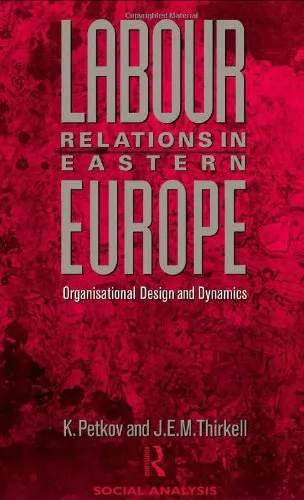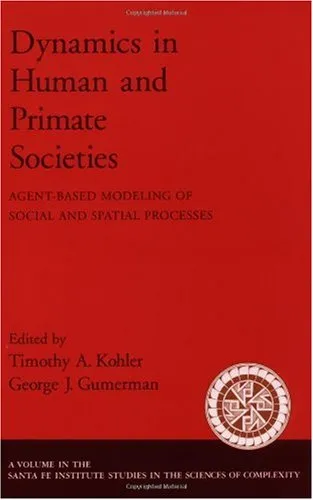Labour Relations in Eastern Europe: Organizational Design and Dynamics (Social Analysis)
3.5
Reviews from our users

You Can Ask your questions from this book's AI after Login
Each download or ask from book AI costs 2 points. To earn more free points, please visit the Points Guide Page and complete some valuable actions.Related Refrences:
Introduction
Labour Relations in Eastern Europe: Organizational Design and Dynamics is an in-depth exploration of the ever-evolving world of labor systems and industrial relations within the diverse socio-economic landscapes of Eastern Europe. Written with a focus on analytical clarity and backed by rich empirical data, this book examines the intersection of historical legacies, modern organizational structures, and the dynamic nature of worker-management interactions.
As the region navigates the tumultuous shift from planned economies to market-driven paradigms, labor relations have proven to be not just a technical issue of organizational design but a profoundly socio-political subject. This book dissects the implications of institutional, cultural, and economic transformations on the nature of work, employment relationships, and workplace dynamics. It explores how labor unions, employers, and governments in Eastern Europe have negotiated their respective roles in shaping modern industrial systems in the post-socialist era.
Aimed at scholars, policymakers, organizational leaders, and curious readers, this book sheds light on the challenges and prospects for industrial democracy, worker rights, and social justice within Eastern Europe's unique development trajectory. By blending theoretical frameworks with case studies from various countries, the book stands as a scholarly yet accessible resource for understanding one of the most important facets of the region's journey through economic transformation.
Detailed Summary of the Book
The book begins by setting the historical stage, outlining the legacy of centralized socialist systems and their accompanying labor relations. It delves into how these top-down systems shaped organizational structures, worker representation, and workplace dynamics in ways that were distinct from Western models. This foundational context provides the backdrop for understanding the subsequent transformation.
A core focus of the book is the transition to market economies and the corresponding reforms in labor relations. It examines how decentralized decision-making, privatization, and globalization have disrupted existing norms, creating both opportunities and challenges. Through country-specific examples—from Poland to Bulgaria and the Czech Republic—the book uncovers the diverse strategies adopted to recalibrate labor systems in each nation.
Another central theme is the evolving role of trade unions and collective bargaining practices. The book investigates the rising tensions between labor and capital, highlighting the power struggle between workers, employers, and governments in an era of increasing inequality. By integrating insights from sociology, political science, and management theory, the book dissects why some industrial systems have adapted successfully while others remain mired in conflict or stagnation.
Key Takeaways
- Labor relations in Eastern Europe are highly contextual, shaped by a combination of historical, cultural, and economic factors.
- The transition from socialism to capitalism profoundly altered workplace dynamics, presenting both challenges and opportunities for all stakeholders.
- Trade unions played a crucial role during the socialist era but are currently undergoing redefinition in their role and function.
- Industrial democracy is key to ensuring social justice and economic equity in the post-transition economies of the region.
- Case studies demonstrate the varying levels of success in labor reform across Eastern European nations, highlighting the importance of institutional design.
Famous Quotes from the Book
"The legacy of command economies continues to cast a long shadow over labor relations, where trust and collaboration often succumb to suspicion and conflict."
"The true test of a labor system is not merely its economic efficiency but its capacity to empower workers and uphold social equity."
"In navigating the turbulence of transition, Eastern Europe offers valuable lessons—not just in what to do, but also in what to avoid."
Why This Book Matters
This book goes beyond the surface analysis of labor relations to uncover the intricate interplay of political, economic, and social forces that shape workplace dynamics in Eastern Europe. It matters because it provides a nuanced understanding of how labor systems adapt—or fail to adapt—in the face of transformative change.
For policymakers, the book serves as a guide for designing labor reforms that balance the needs of workers and businesses while fostering economic growth. For scholars, it is a valuable resource for understanding the complexities of post-socialist transformation. For practitioners and business leaders, it offers practical insights into navigating the challenges of industrial relations in a rapidly changing environment.
In an era where globalization and economic inequality dominate headlines, understanding the successes and struggles of Eastern Europe’s labor systems provides not just regional relevance but global significance. This book is a call to critically rethink labor relations, institutional design, and the importance of social justice in fostering sustainable societies.
Free Direct Download
You Can Download this book after Login
Accessing books through legal platforms and public libraries not only supports the rights of authors and publishers but also contributes to the sustainability of reading culture. Before downloading, please take a moment to consider these options.
Find this book on other platforms:
WorldCat helps you find books in libraries worldwide.
See ratings, reviews, and discussions on Goodreads.
Find and buy rare or used books on AbeBooks.













